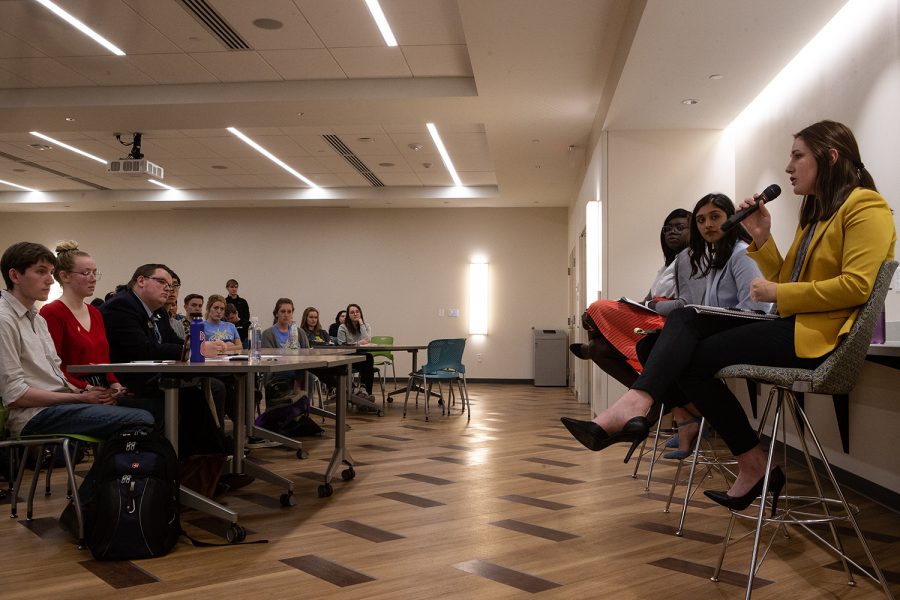UISG VP candidates hold debate
The candidates spoke on a variety of issues including tuition increases, fund allocations, accessibility, and diversity and inclusion.
Vice President candidates answer questions during a University of Iowa Student Government Vice Presidential Debate at Catlett Hall on Thursday, March 28, 2019. The election period for UISG begins on April 3 at 8 a.m. and ends on April 4 at 5 p.m.
March 29, 2019
The three University of Iowa Student Government vice-presidential candidates participated in a UISG VP debate on Thursday night at Catlett Hall.
Madhuri Belkale of Inspire UI, Sarah Henry of Ignite Iowa, and Adiu Arou of UI Charge discussed tuition increases, connections with the state Board of Regents, student-services funding allocations, state policy issues, campus accessibility, representation, and diversity and inclusion.
The first question, regarding how candidates will handle financial hardships, referenced a 2016 UI study in which 52 percent of students reported feeling alarmed about their financial situations.
Arou said she plans to address financial hardships by helping students to express their opinions directly to the state Legislature.
Belkale said her team would advocate for resources that exist at the UI, such as textbook-donation services and a loan program for graduation gowns.
“It’s important that every Hawkeye has an equitable path to graduation,” Belkale said.
Henry said she wanted to improve the relationships among UISG senators and their state legislators.
Candidates had varied responses to how they would allocate student funds.
“Student dollars should be going toward things that directly will affect us,” Henry said, advocating for the mental-health fee. The $2 per student fee would increase the reach of University Counseling Service, she said.
RELATED: Three tickets will run in this year’s UISG election
Arou said the student activities fee should go toward initiatives supporting students’ health.
“We have to ask them where they want to see their funds go to, ideally,” she said. “We first must reach out to them and see what it is that they want on campus.”
Her team would advocate for the Student Disabilities Service to be moved somewhere on campus so that it is accessible to students with disabilities, she said.
Belkale said her team hopes to include closed captioning on all online university classes and accessible desks in all university buildings.
Henry said she hopes to make sure that students with disabilities feel that their voices are valued and heard, pointing to the challenges that students face when filing reports concerning disability concerns.
VP candidates were also asked a series of questions about diversity and inclusion.
Belkale said microaggressions are a consistent problem on campus. In response, her team would implement implicit-bias training for all faculty and staff.
“I think representation is often described as having a seat at the table,” Belkale said. “Representation is not about having people in a room … it’s also about recognizing that it’s important to recognize all voices.”
Henry advocated for increased outreach by UISG to ensure all students have a place at the table to discuss their ideas.
Arou said representation is important for all students. One of her policy ideas is adding more constituency seats for nontraditional students.
Candidates were asked about their platforms responding to incidents of sexual assault among UI students.
Arou said continuing to discourage drinking would lower sexual-assault rates.
Belkale, a research assistant focusing on sexual aggression, said that she would advocate for UISG to be involved in discussions regarding sexual-assault prevention.
She would advocate for UI Housing to offer residence halls as a safe space for students to stay if they are experiencing domestic violence at home, she said.
Henry said she wants to continue UISG’s financial and policymaking support to sexual-assault prevention and response programs.
“We need to advocate for students with the administration to not roll back any of the Title IX regulations we have on campus,” she said. “We need to make sure our university is committed to protecting sexual assault survivors in that way.”







